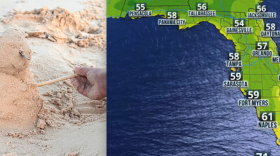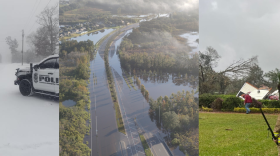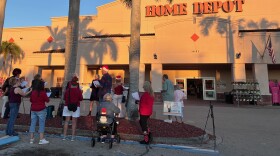The U.S. Supreme Court announced Thursday that it has agreed to hear a case next term that could upend election laws across the country with the potential endorsement of a fringe legal theory about how much power state legislatures have over the running of congressional and presidential elections.
The case, called Moore v. Harper, is centered on newly drawn maps of voting districts for North Carolina's 14 seats in the next U.S. House of Representatives.
Republican state lawmakers want to resurrect a map that North Carolina's state courts struck down, finding that the map approved by the GOP-controlled legislature violated multiple provisions in the state's constitution by giving Republican candidates an unfair advantage through partisan gerrymandering. A court-drawn map has been put in place instead for this year's midterm elections.
In their appeal to the U.S. Supreme Court, however, the Republican lawmakers argue that the U.S. Constitution's Elections Clause gives state legislatures the power to determine how congressional elections are conducted without any checks and balances from state constitutions or state courts.
Based on this independent state legislature theory, they contend that the North Carolina state courts' decision to throw out and replace the legislature-drawn map violates the federal constitution — an argument that radically departs from the U.S. Supreme Court's historical record of deferring to state courts on how state constitutions and laws should be interpreted.
A Supreme Court endorsement of the theory could upend elections laws across the U.S.
The high court declined in March to weigh in on an emergency request for this case, but in a dissenting opinion, three of the court's conservatives — Justices Samuel Alito, Neil Gorsuch and Clarence Thomas — signaled they would likely side with the Republican lawmakers' embrace of this theory.
Many legal scholars, however, have been waving warning signs that the high court's endorsement of the theory could have severe consequences across the country for congressional and presidential elections.
"It would be extremely disruptive," says Carolyn Shapiro, a law professor and founder and co-director of Chicago-Kent College of Law's Institute on the Supreme Court of the United States. "It would allow the possibility that people who don't like state supreme court rulings that have been on the books potentially for years could step back in and say, 'Well, actually, that ruling only applies to state elections.' "
Under this theory, Shapiro adds, holding elections for different levels of government at the same time could become practically difficult given that officials would potentially have to prepare for different sets of ballots, voter registration systems and, in some states, voter ID laws.
The court's support for the theory could also affect the 2024 presidential election
Vikram Amar, dean of the University of Illinois College of Law, notes that a "hyper-charged" version of the theory pointing to the Electors Clause of the U.S. Constitution served as the backdrop for the "fake electors" scheme that is a focus of the House select committee investigating the Jan. 6 attack on the U.S. Capitol.
Depending on how broadly the Supreme Court rules in the North Carolina redistricting case, Amar says support for the theory by the court could affect the 2024 presidential election. States with Republican-controlled legislatures could see it as an invitation to set new election rules that take power away from voters when picking electors for the Electoral College or to make state lawmakers, not courts, the judges in disputes after the election.
"It is really a grave danger to American democracy to say that state legislatures are free from state constitutions to do whatever they want," says Amar, who co-wrote an article for the Supreme Court Review at the University of Chicago about how the theory goes against an originalist understanding of the U.S. Constitution. "State constitutions are an important source of American democracy, limits and rights. And I think it would be terrible if the U.S. Supreme Court distorted federalism to reject that very important premise."
To Shapiro, the Chicago-Kent College of Law professor, the theory "doesn't make any sense at all."
"The legislatures are created by constitutions. Their powers are defined by constitutions. The way those powers interact with other branches of state government is defined by state constitutions. Limitations on those powers are defined by state constitutions," says Shapiro, who wrote an upcoming article on the theory's origins and implications for The University of Chicago Law Review. "The idea that there's some kind of legislative power that is separate and apart from the ordinary constitutional limitations is really quite remarkable and lawless."
Copyright 2023 NPR. To see more, visit https://www.npr.org.









